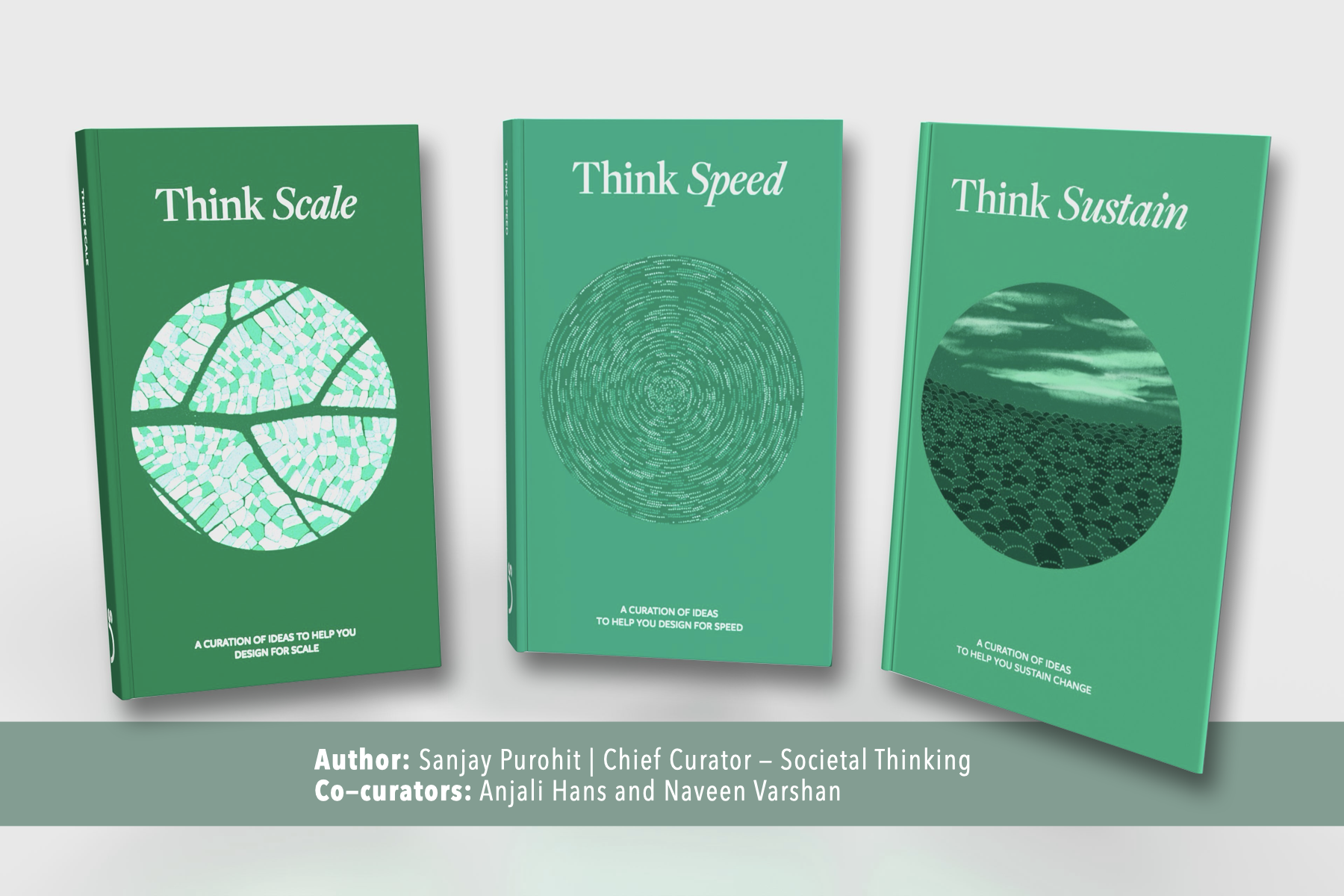I remember my first conversation with Sanjay Purohit, (Chief Curator, Centre for Exponential Change) just before the I’s were dotted and t’s crossed for me to join the team at Societal Thinking. I remember asking him how he does what he does – work in the social sector, come face to face with the not-so-pleasant realities of our world – and remains hopeful for the future. I was specifically asking him this in the context of climate change because I care deeply about our planet. I am also part of the unfortunate generation that faces climate anxiety not knowing how to act, cope and remain hopeful with everything happening with our planet. I confessed to him, that I find it hard on most days to continue practising my little sustainable alternatives in my everyday life and not wonder if it has any impact or meaning when I look at it from the grander scale of things. And I know, I’m not the only one thinking this way. But Sanjay’s response would distinctly mark a shift in how I started viewing climate change. On days I’m feeling especially hard to tap into positivity, I go back to what he said to me in response that day.
“You’re right. I may not always be able to gauge the depth of impact my actions have. But what good does it do, if I just sit and dwell on that fact? Whether I choose to think that way or not, it has no consequence on my reality and state of affairs. Instead, I wake up every day knowing that what I am doing is helping chip away at the problem, little by little. And as long as I know that I’m working on helping reduce the size of the problem, I will happily continue to do it for as long as I am able to.”
On this World Environment Day, I want to share some stories of hope that I have witnessed in my climate action journey with Societal Thinking. From the deep forests of meso-America to the turquoise water of the Philippines, from the farmlands in Kenya to the majestic mountains in Meghalaya, change leaders across the globe are driving climate action in their distinct ways. By ensuring that those closest to the problem are involved in the solution-designing process, these organisations have ensured their efforts to combat climate change are extremely contextually important. Each of us will have lessons to take away from these stories. But most importantly, I hope that these stories of change showcase how restoring agency to the community, through behaviour change, involving them in policy changes and working together with Sarkaar (governments) and Bazaar (markets) opens up avenues to help solve climate change at societal scale, with speed and sustainably.
Fish Forever at Rare
I spoke with Rocky Sanchez, Managing Director at Fish Forever early this year while prepping for our panel discussion at Global Ecosystem Meetup. If you’ve met Rocky or spoken to her, you know that she radiates calmness and positivity much like the work she does. Fish Forever works at the intersection of behaviour change and community-led climate action. They use a community-led approach to manage coastal fisheries and restore marine ecosystems. Much of their work focuses on orchestrating key societal actors, like local fishers, community leaders, government agencies, non-governmental organisations (NGOs), and scientists, enabling them to solve complex environmental problems collectively and efficiently. By integrating local communities, scientific research, and traditional knowledge, they foster co-creation ecosystems where diverse stakeholders are working together towards sustainable solutions.
Machete Project
Sarah Otterstrom, Executive Director of Paso Pacifico, whom I briefly interacted with during our LinkedIn Live hosted at the same time last year, discussed how we can keep communities at the centre while designing solutions to drive climate action.
Project Machete harnesses the traditional knowledge and skills of rural farmers, particularly their expertise in using machetes, which have been part of their culture for centuries. Understanding that local problems can often be best solved by those who are closest to them, Machete Project respects and utilises local wisdom to restore forests.
The Machete Project also fosters interactions among various community members, particularly by connecting young people who have migrated to urban areas with their original rural communities. These young adults play an important role in educating and persuading farmers about the importance of forest restoration, thereby creating a bridge between different generations and enhancing community cohesion.
Kuza Biashara
Kuza is our newest co-traveller in the Societal Thinking Scaler Journey. At the Global Ecosystem meetup, I met Sriram Bharatam, Founder of Kuza, and learned firsthand about Kuza’s evolution. Through their innovative “Business-in-a-Box” model, Kuza empowers young people, women, and small business owners with the tools, training, and support needed to develop sustainable agricultural businesses. By partnering with government agencies, private companies, development organisations, and local communities, Kenya One Network (an open digital agriculture network, led by Kuza and enabled by Beckn) creates a comprehensive support system for smallholder farmers and agripreneurs.
Kuza encourages regenerative agricultural practices by leveraging community power and technology. Their programmes teach farmers climate-smart and regenerative farming techniques to improve soil health, increase biodiversity, and mitigate climate change. Kuza’s digital platforms facilitate the dissemination of these practices and enable real-time data collection and analysis, helping farmers make informed decisions. By fostering strong community interactions and creating a network of digitally empowered youth agripreneurs, Kuza is driving the widespread adoption and scaling of sustainable agricultural practices.
I’d like to end with my favourite quote from Dave Weinstein, Associate Dean at the Stanford Doerr School of Sustainability, that I have heard him say on various occasions – “There is nothing you can do personally to make a difference regarding the impending climate change crisis. How many times have you heard that? One person’s actions cannot make a difference. But what about a million, or 10 million or a billion.”
In 2024, it is time for us to reimagine how we’re looking at climate change. It is time to start including everyone in the ecosystem and not just rely on a top-down approach if we want to make it count. We need to use knowledge, technology and co-creation to drive more sustainable behaviours. “It is time to encourage “one small step” toward the planet with the hope that one small step for man will represent one giant leap for mankind” as Dave says. Only when we can get all people to engage even in small ways actively, can we create the ripple that will lead to exponential climate action.
 Back
Back


